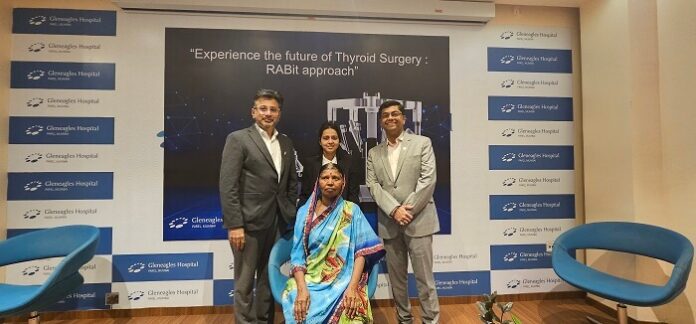In a groundbreaking achievement, Gleneagles Hospital Mumbai has successfully conducted the city’s first Robotic-assisted Breast-axillo Insufflation Thyroidectomy (RABIT) on a 60-year-old female farmer from Varnanagar, Kolhapur. This innovative procedure represents a significant advancement in thyroid surgery and has left the patient symptom-free.
Mrs. Gokula Patil, a resident of Varnanagar in Kolhapur district, was visiting her son in Mumbai when she sought medical attention at Gleneagles Hospital, Parel, for a large swelling on the left side of her neck. She had been living with a benign thyroid swelling for four years, managed conservatively, but the size of the swelling had gradually increased over time.
Upon further evaluation, which included sonography and a CT scan, multiple nodules were detected in her left thyroid gland, with a smaller nodule on the right side. A biopsy confirmed the benign nature of these nodules. Mrs. Patil was then referred to endocrinologist Dr. Sneha Kothari, who, considering the growth of the nodules, recommended a thyroidectomy.
Dr. Jignesh Gandhi, Senior Consultant Robotic & Laparoscopic Surgeon, performed the RABIT procedure using the Da Vinci robotic system. This technique offers a minimally invasive alternative to conventional thyroid surgery, enhancing surgical precision while reducing trauma. The robotic-assisted approach results in smaller incisions and minimal scarring, leading to faster recovery, less postoperative pain, and a lower risk of complications. The robotic system provides surgeons with improved visualization and dexterity, allowing for precise dissection and preservation of vital structures.
Dr. Gandhi explained, “Traditional open surgery often leaves large, visible scars and requires longer recovery times. The RABIT technique uses small 8 mm incisions in discreet areas such as the axilla and along the areolar regions, avoiding visible neck scars and preserving muscle integrity. This results in minimal post-operative pain and faster healing. The entire procedure takes 1-2 hours, with minimal blood loss, ensuring the safety of critical structures like the parathyroid glands and the recurrent laryngeal nerve.”
Expressing her gratitude, Mrs. Patil said, “I am immensely grateful to Dr. Jignesh Gandhi and his team for this life-changing procedure. After years of discomfort, I am now symptom-free and can resume my daily activities without visible scars or pain.”
Dr. Vivek Talaulikar, COO of Gleneagles Hospitals, Mumbai, highlighted the hospital’s commitment to cutting-edge healthcare: “At Gleneagles Hospitals, we are dedicated to transforming patient care through the latest technological advancements. The successful implementation of the RABIT technique showcases our dedication to offering innovative treatments that improve patient outcomes and quality of life. Robotic procedures like RABIT represent our approach to healthcare, providing precision, safety, and faster recovery for our patients. By incorporating such advanced technologies, we aim to set new benchmarks in healthcare and ensure our patients receive the best possible care.”
This pioneering procedure not only demonstrates the exceptional expertise of the medical team at Gleneagles Hospital but also reflects the hospital’s commitment to adopting advanced technologies to provide superior patient care.
























